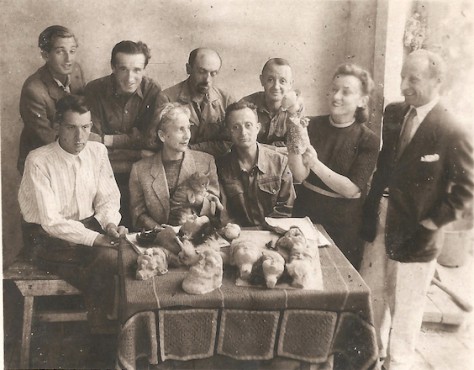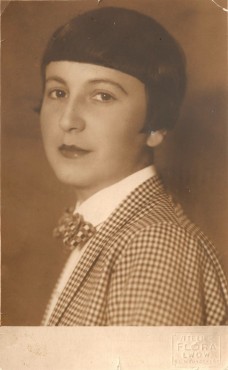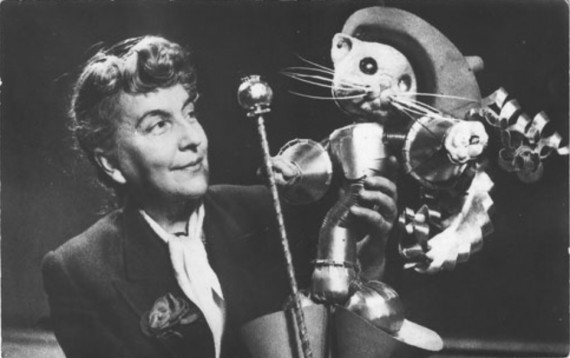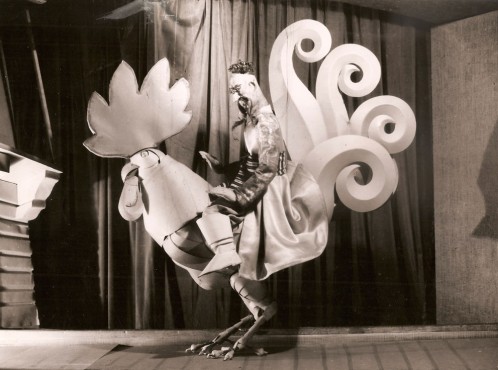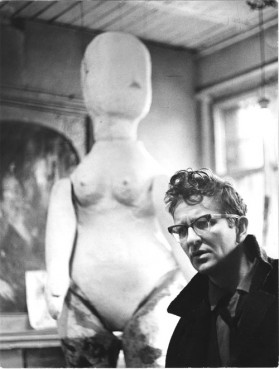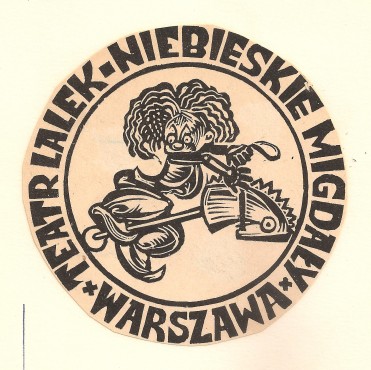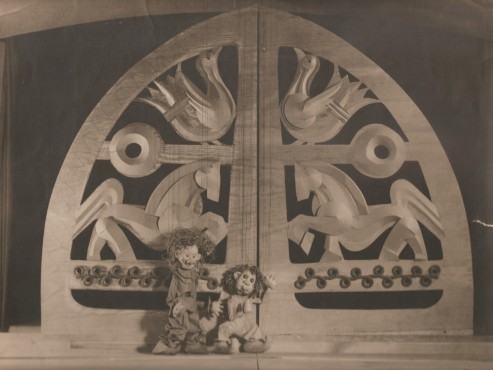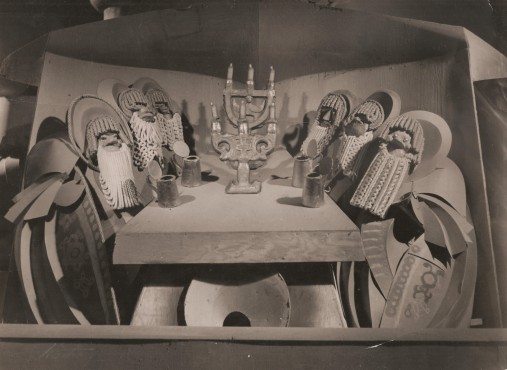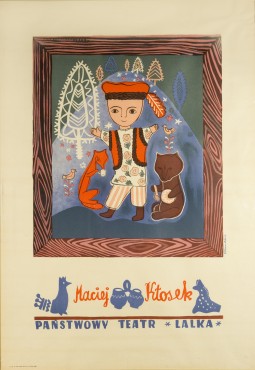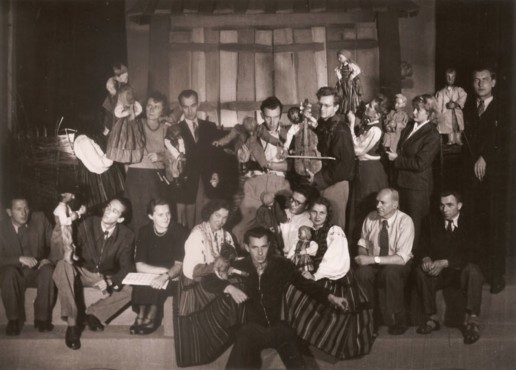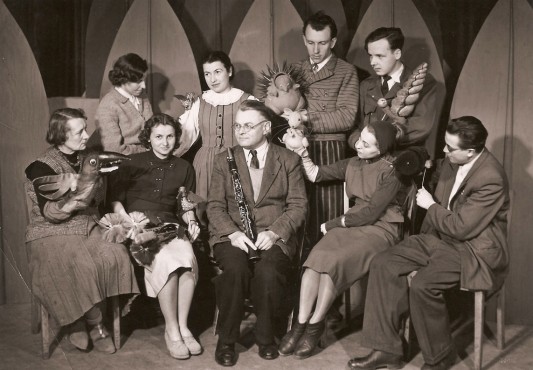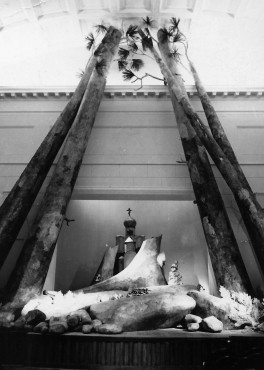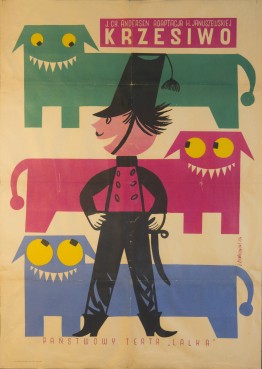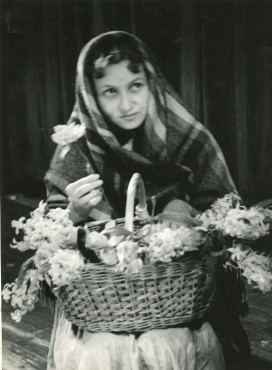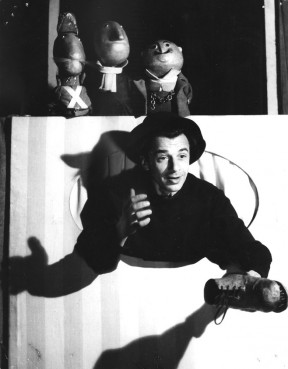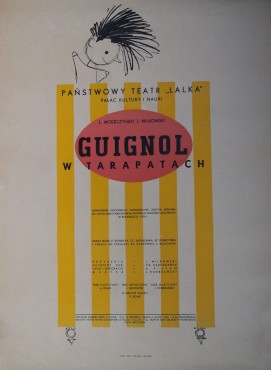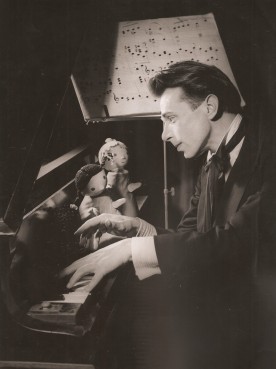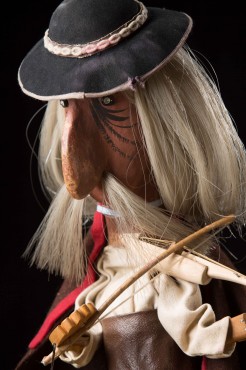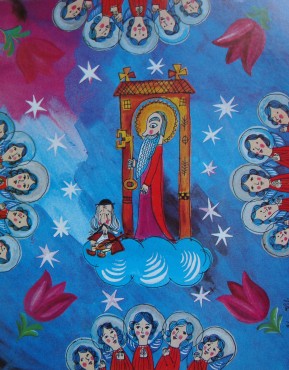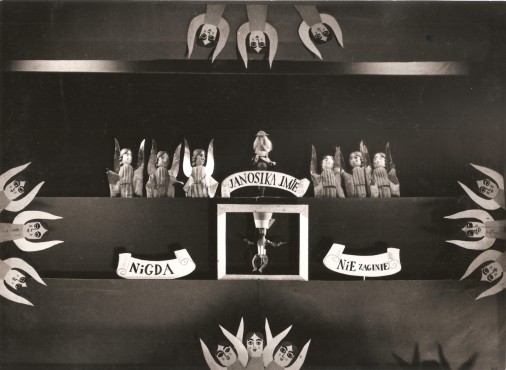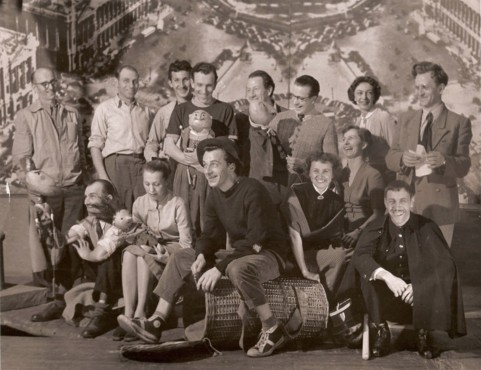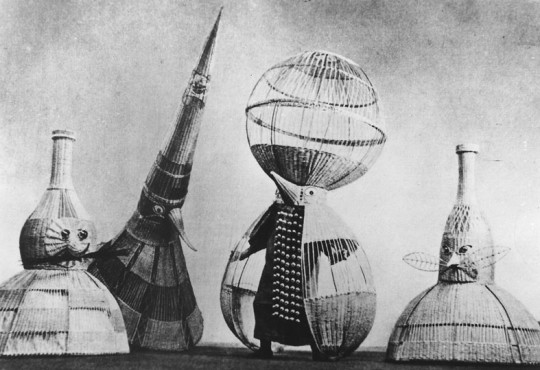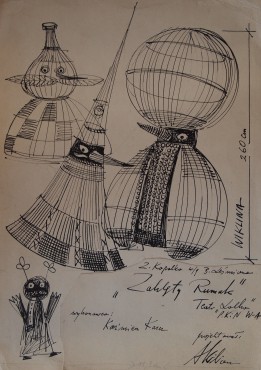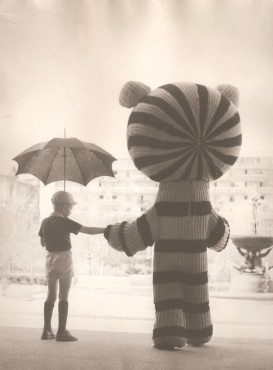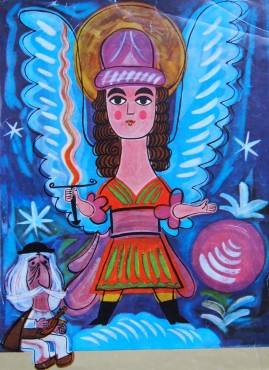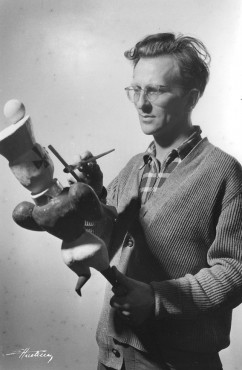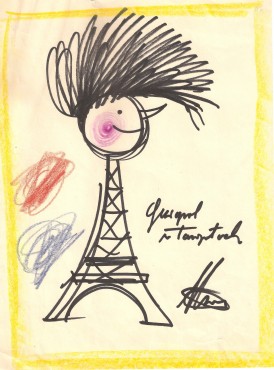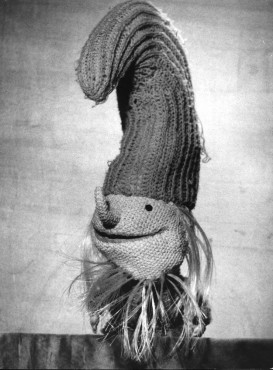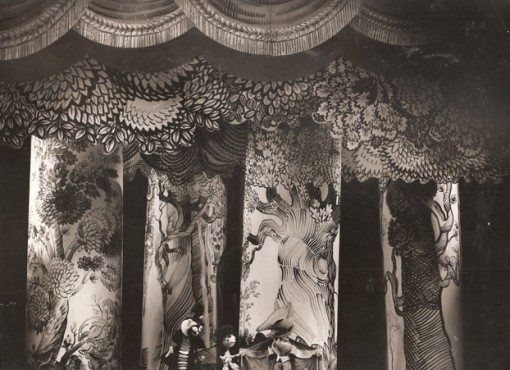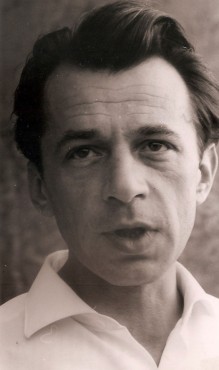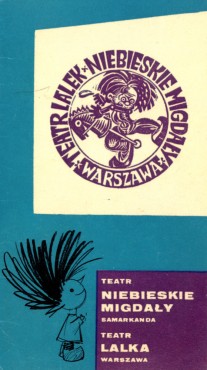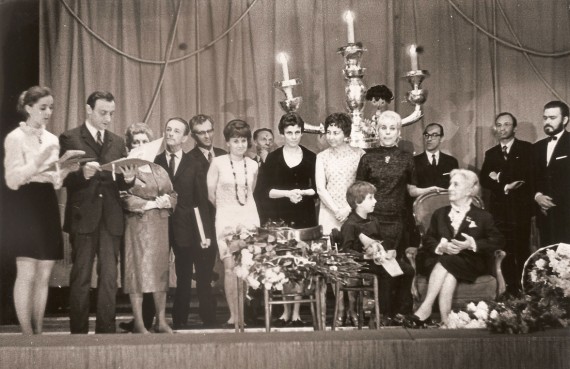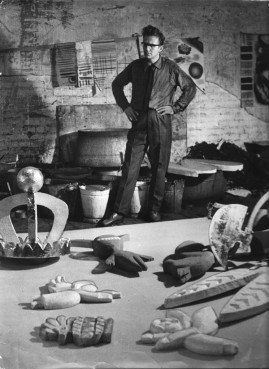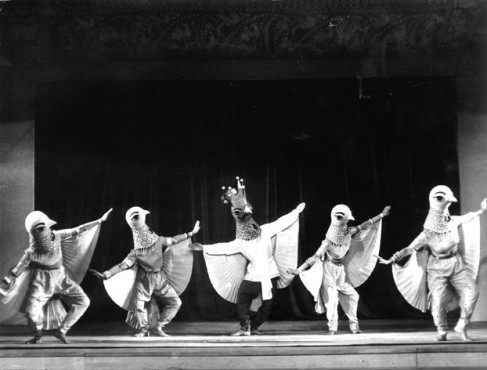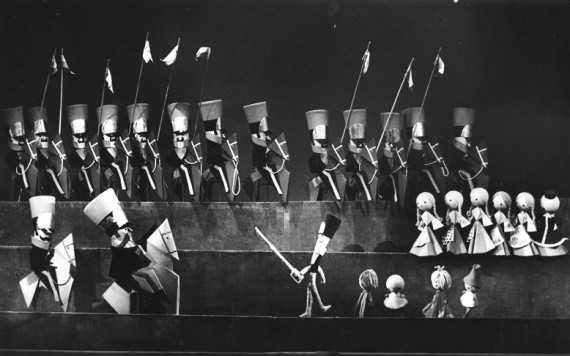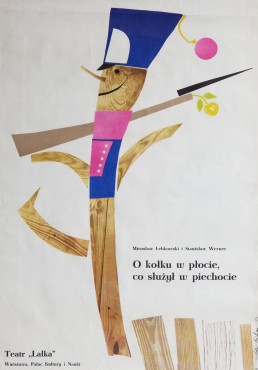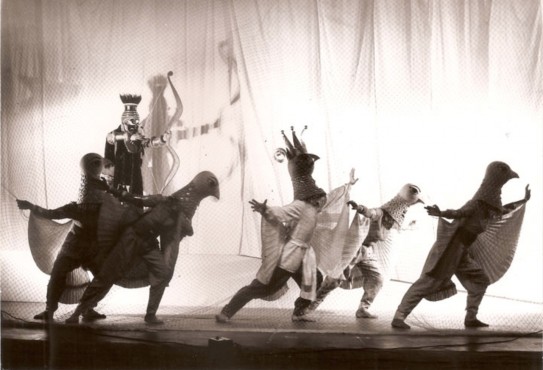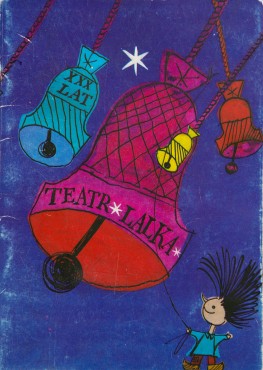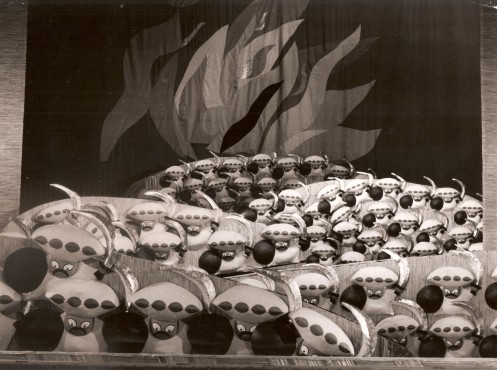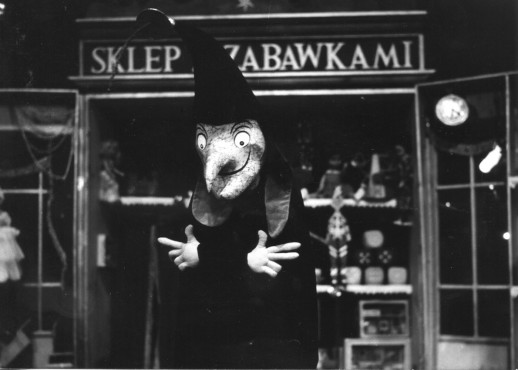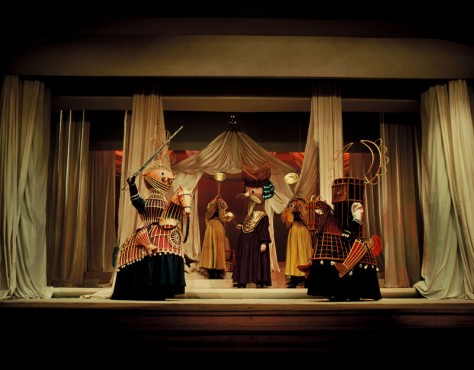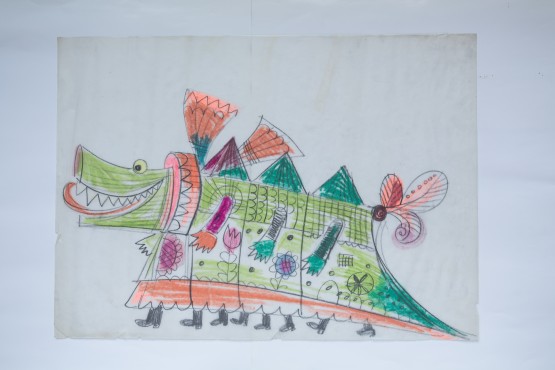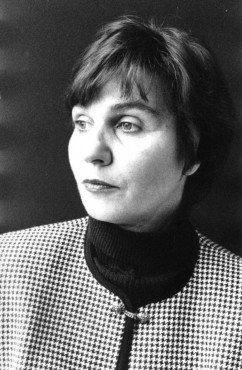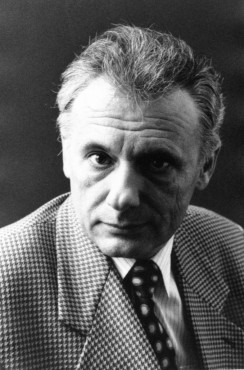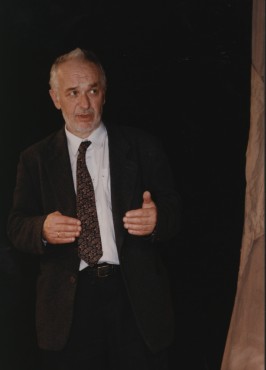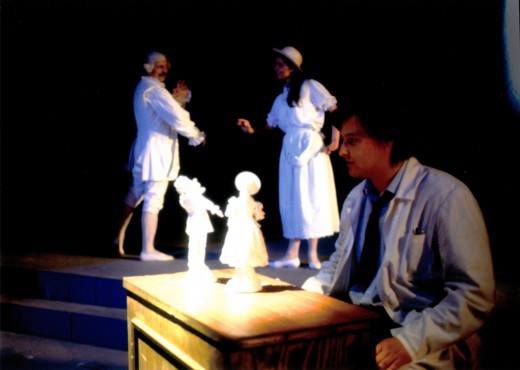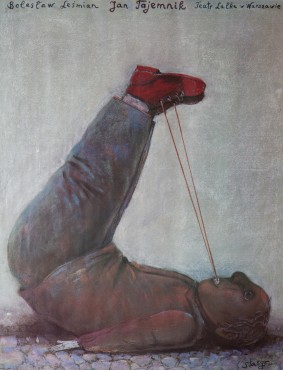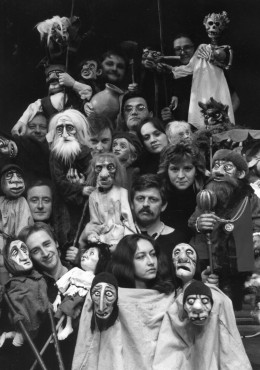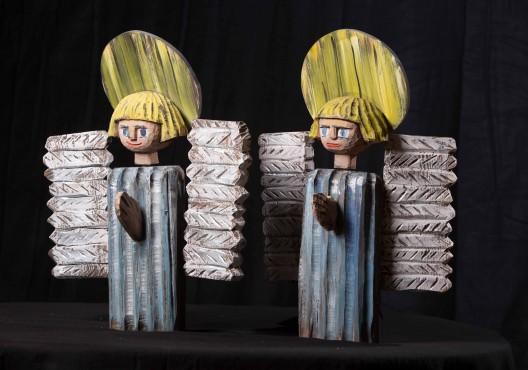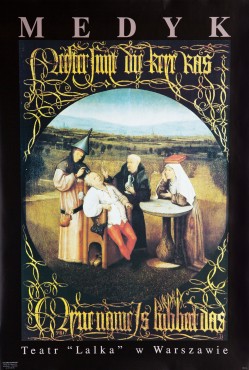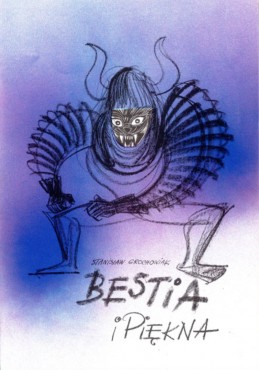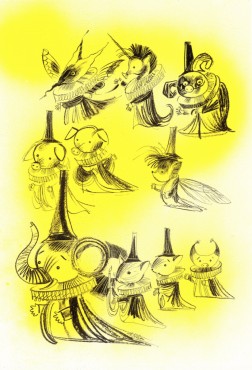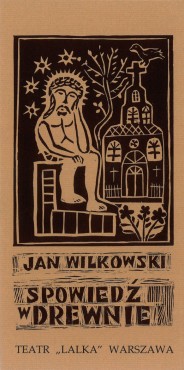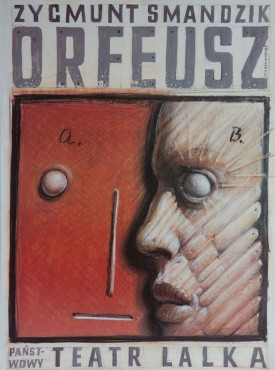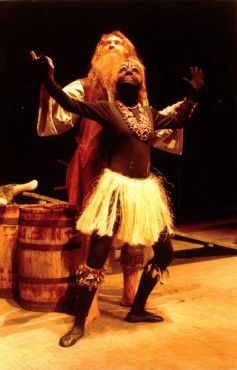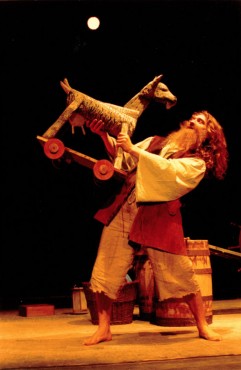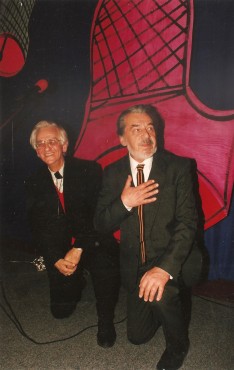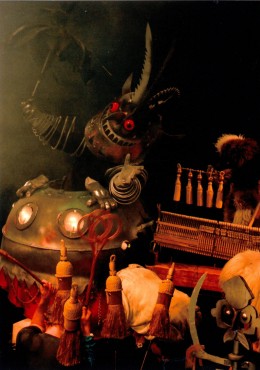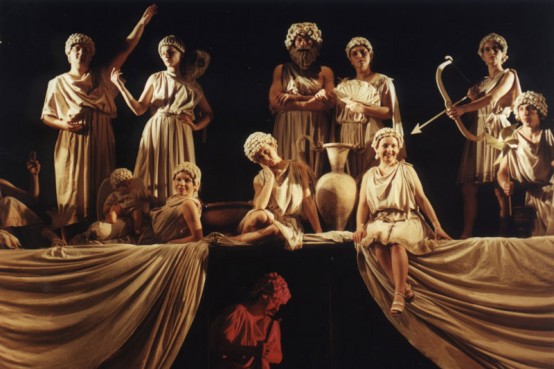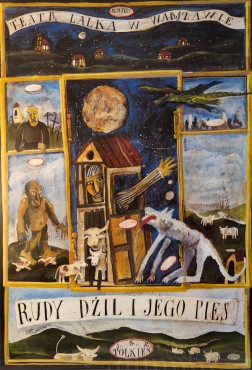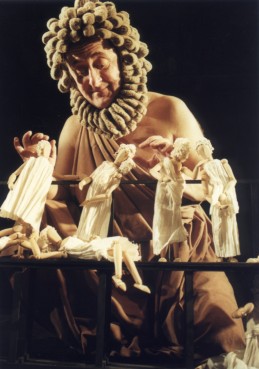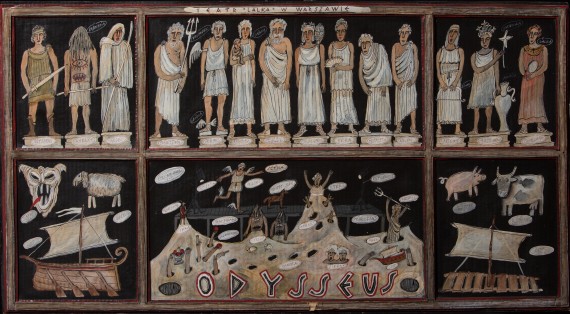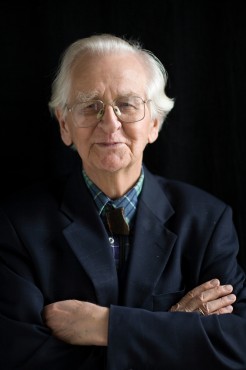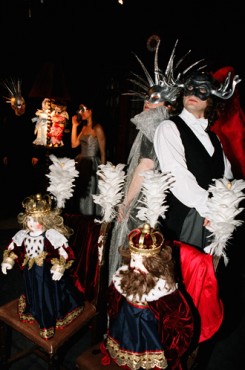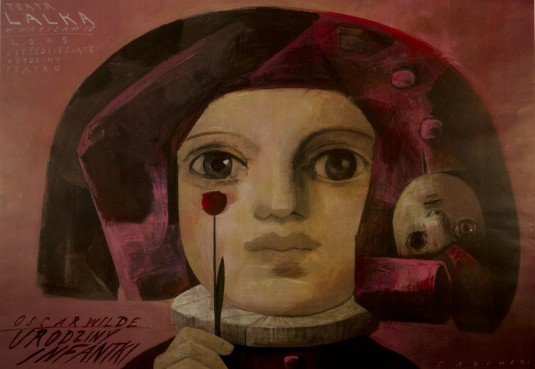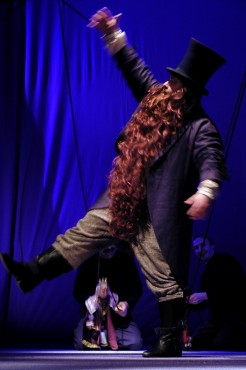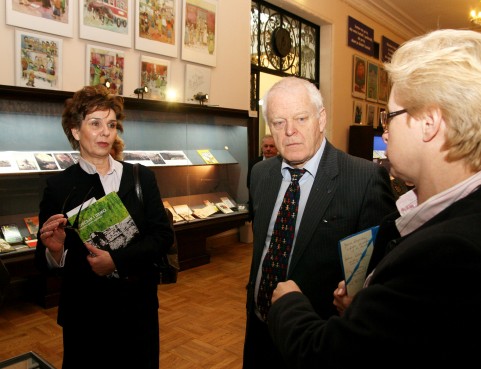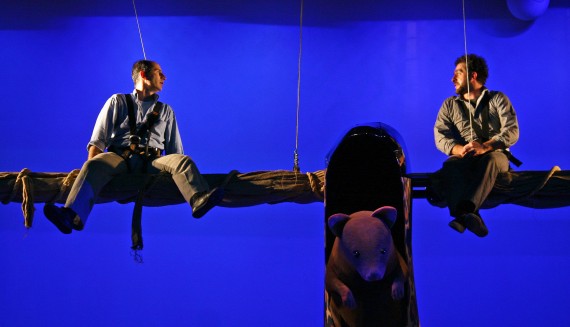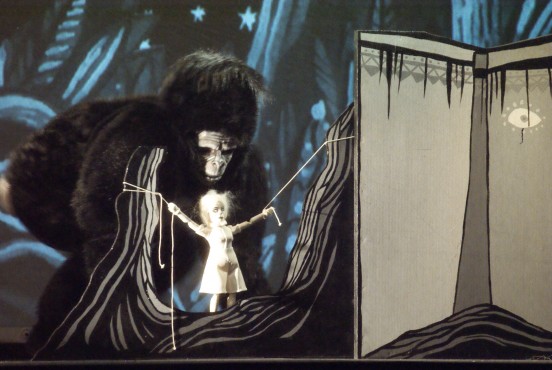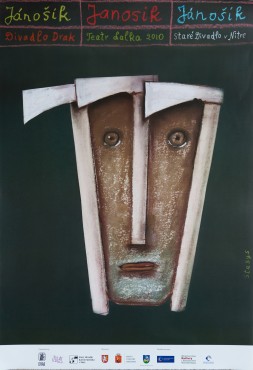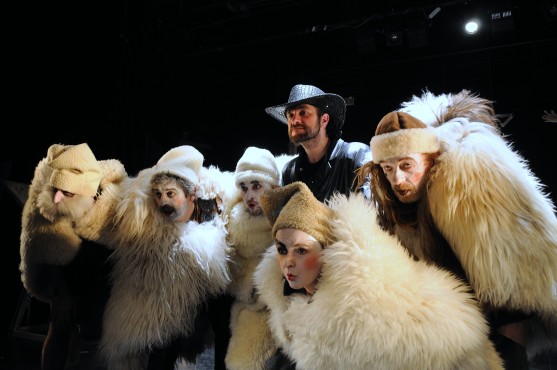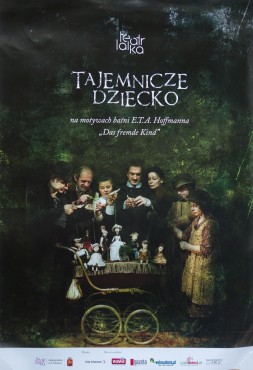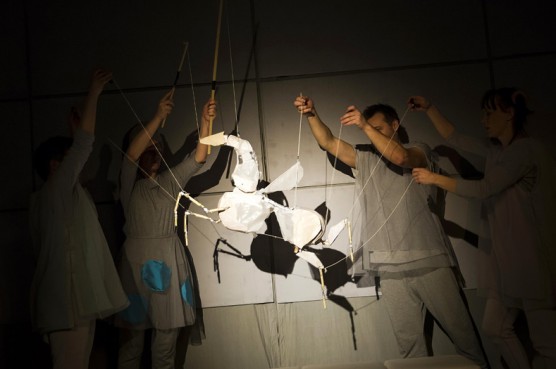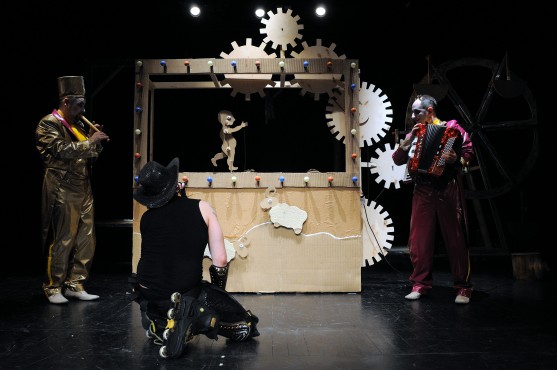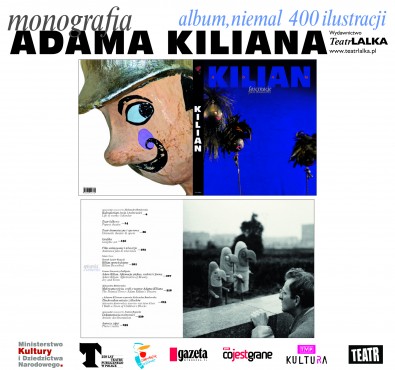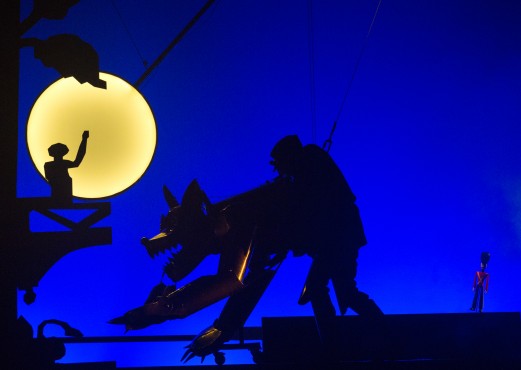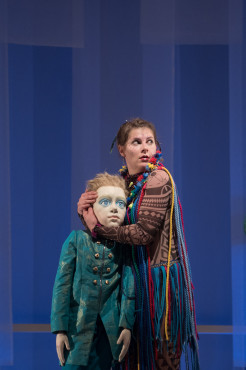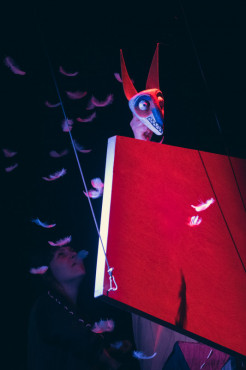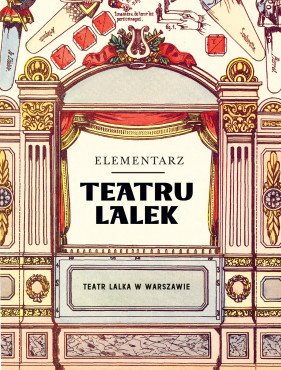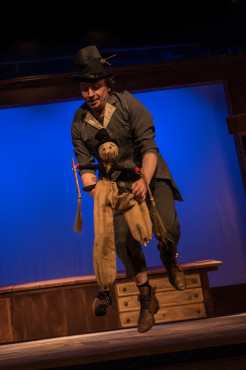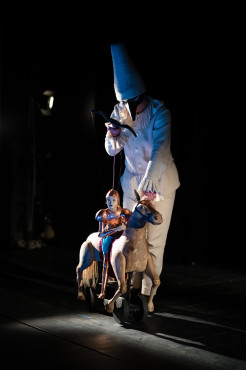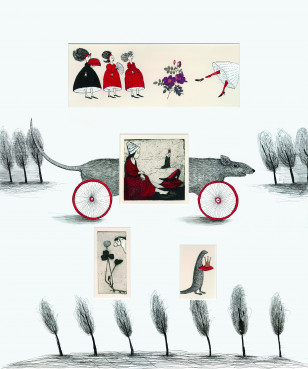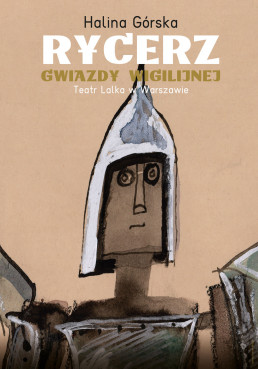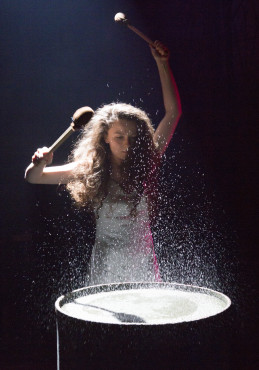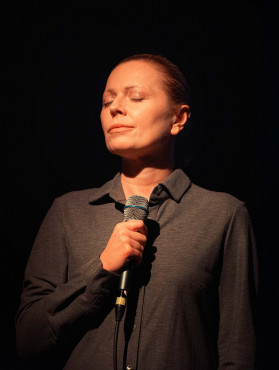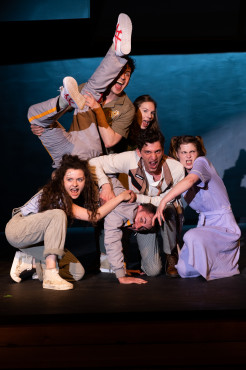History - Teatr Lalka
1945-49
-
6 May – Janina Kilian-Stanisławska, art historian and illustrator deported from Lvov to the Soviet Union in 1940, establishes the Blue Almonds Polish Puppet Theatre in Samarkand, operating under the auspices of the Uzbek State Philharmonic in Tashkent.
22 October – Premiere of Adam Mickiewicz’s Pani Twardowska (Madam Twardowska) inaugurating the Blue Almonds Theatre under the artistic direction of the institution’s founder.
-
25 May – The Blue Almonds Theatre is repatriated to Poland. It merges with Teatr Groteska at ul. Basztowa 6, Kraków. Zofia Stanisławska-Howurkowa, graphic artist and set designer, becomes the director of the theatre. Janina Kilian-Stanisławska remains artistic director.
-
7 April – Premiere of Pani Twardowska, directed by Janina Kilian-Stanisławska with set design by Zofia Stanisławska-Howurkowa in Kraków opens the theatre’s operations there.
-
1 July – The Blue Almonds Theatre moves to Warsaw. Adam Kilian, a former soldier in Gen. Anders’ Polish Army, becomes the director of the theatre. He comes to Warsaw from Great Britain, where he studied architecture at the College of Art and Crafts in Nottingham. The strong artistic team of the theatre is formed by Janina Kilian-Stanisławska, artistic director; Zofia Stanisławska-Howurkowa, graphic manager, and Jerzy Dobrzański, music director.
– The theatre settles in the former location of Teatr Jaskółka (Swallow Theatre) in the ruins of Warsaw, at ul. Marszałkowska 69.
– Janina Kilian-Stanisławska opens the Puppet Theatre School at ul. Słupecka 7. Its students Jan Wilkowski, Władysław Pękalski and Czesława Sadurzanka perform at the Blue Almonds Theatre.
-
2 February – First Warsaw premiere—Kopciuszek (Cinderella), directed by Kilian-Stanisławska, with set designs by Kilian and puppets by Howurkowa.
1950-59
-
– The Blue Almonds Theatre is nationalized.
11 February – Premiere of Pushkin’s Bajka o rybaku i złotej rybce (The Tale of the Fisherman and the Fish), the most notable achievement of Janina Kilian-Stanisławska (with set designs by Kilian and puppets by Howurkowa).
1 September – The Puppet Theatre Drama School founded by Kilian-Stanisławska is nationalized.
– In November Władysław Jarema is appointed the new artistic director of the Blue Almonds, from now on called Teatr Lalka. Jan Zakrzewski becomes managing director. The new theatre management lasts for one year. Janina Kilian-Stanisławska still works there as a director, Adam Kilian as a set designer.
-
– After the resignation of Jarema and Zakrzewski the Minister of Culture and Art appoints Jan Wilkowski as artistic director of Teatr Lalka.
21 November – Premiere of Władysław Jarema’s Maciej Kłosek takes place in the hall of the city council at ul. Polna 26, directed by Jan Wilkowski, with set design by Jerzy Tchórzewski and puppets by Jerzy and Lidia Skarżyński.
-
– Jan Wilkowski, actor, stage director and graphic artist, becomes the artistic director of Teatr Lalka at the age of 27.
21 June – Premiere of Jerzy Zaborowski’s Zielony Mosteczek (The Little Green Bridge), directed by Jan Wilkowski, sets designed by Adam Kilian (at the Central Children’s Home on ul. Bracka).
– The theatre struggles with organizational problems and unsuitable premises.
27 June – The last graduates leave the Puppet Theatre Drama School founded by Kilian-Stanisławska.
31 July – The Puppet Theatre Drama School is closed. The only person to defend it is Jan Sztaudynger, who writes, “The attack on the school is a black mark on puppet art.”
-
1 November – Stanisława Bojarowa becomes the managing director of Teatr Lalka for the next 17 years.
-
7 July – Premiere of Preobrazhensky and Obrazcov’s Wielki Iwan (Ivan the Great), directed by Jan Wilkowski, with set desigs by Adam Kilian, puppets by Zofia Stanisławska-Howurkowa, in the theatre’s new location at ul. Świerczewskiego 76, in the former Calvinist chapel designed by Zug. “With Ivan the Great the puppet theatre became truly monumental. Even in an opera you wouldn’t find such proportions as between the small figure of the tsar and trees that were twelve meters high” (Adam Kilian).
-
22 July – Grand opening of the permanent location of Teatr Lalka in the Palace of Culture and Science: premiere of Andersen’s Krzesiwo (The Tinderbox), adapted by Hanna Januszewska, directed by Jan Wilkowski, with set designs by Adam Kilian, puppets by Zofia Stanisławska-Howurkowa and music by Jerzy Dobrzański. Krzesiwo is the first production making such spectacular use of the means of modern theatre. The premiere is a turning point in the history of Teatr Lalka.
-
21 March – Premiere of Leon Moszczyński and Jan Wilkowski’s Guignol w tarapatach (Guignol in a Stew), directed by Jan Wilkowski, with sets and puppets by Adam Kilian. The production sets new directions for Polish and European puppet theatre. Guignol w tarapatach is broadcast on television. Two years later the production is awarded the Grand Prize and Gold Medal at the International Festival of Puppet Theatres in Bucharest. With this success the creators of Guignol w tarapatach gain international renown.
-
11 May – Premiere of Jan Wilkowski’s Zaczarowany fortepian (The Enchanted Piano). Wilkowski is author, director, and the only live actor on stage: Violini Smutek (Violini Sadness). Adam Kilian designs the sets and puppets. The production is broadcast on television.
-
23 December – Premiere of O Zwyrtale Muzykancie czyli jak się góral dostał do nieba (Zwyrtala the Fiddler, or How a Highlander Went to Heaven), based on Kazimierz Przerwa-Tetmajer’s tale, staged and directed by Jan Wilkowski. Kilian designs the sets and puppets, the music is written by Krzysztof Penderecki. Years later Prof. Henryk Jurkowski wrote, “This production remains the highest achievement of Polish puppet theatre.”
-
31 January – Teatr Lalka celebrates its 15th anniversary.
3–18 June – Teatr Lalka takes part in the Theatre of Nations Festival in Paris, presenting Guignol w tarapatach and O Zwyrtale Muzykancie. Jan Wilkowski is awarded the Young Critics’ Diploma as “the most outstanding puppet artist of the season.” Both productions are presented later in the year at festivals in Czechoslovakia and Vienna.
– Adam Kilian is awarded the Medal of the National Education Commission.
1960-69
-
25 March – Premiere of Jan Wilkowski’s Tymoteusz Rymcimci (Timothy Rimcimci) directed by Jan Wilkowski with sets by Adam Kilian. The first of a series of plays about the adventures of Timothy the Bear, popular in Poland and abroad, from Japan to America.
28 March – O Zwyrtale Muzykancie represents Poland at the International Festival of Puppet Theatres in Braunschweig, West Germany. A year later the production is presented at the Italian 4th Festival dei Due Mondi in Spoleto (7 times) and Torino (twice).
10 June – Premiere of Zbigniew Kopalko’s Zaklęty Rumak (The Enchanted Steed), based on Bolesław Leśmian. It introduces new material into the puppet theatre. For the first time Kilian designs puppets and masks of wicker.
-
23 March – Premiere of Hanna Januszewska and Jan Wilkowski’s Tygrys Pietrek (Pietrek the Tiger), directed by Jan Wilkowski with set designs by Adam Kilian.
19 April – Tygrys Pietrek is awarded a diploma of the UNIMA Presidium at the International Puppet Theatre Festival in Warsaw accompanying the 8th UNIMA Congress.
-
1–22 May – O Zwyrtale Muzykancie tours Sweden (Norrköping, Göteborg, Stockholm) and appears also in Helsinki, Finland.
22 July – Adam Kilian receives the 2nd-degree Award of the Polish Minister of Culture and Art for his achievement in set designs for Teatr Lalka and for original sets for Stanisław Wyspiański’s Wesele (The Wedding) at Teatr Dramatyczny in Szczecin.
-
12 July – 30 August – Adam Kilian and Jan Wilkowski visit the United States at the invitation of the State Department.
-
13–20 February – Teatr Lalka presents Guignol w tarapatach in Stockholm and Uppsala during the Polish Culture Days in Sweden.
-
15 February – Premiere of Wilkowski’s play My i krasnoludki [We and the Dwarves], his last show as artistic director of the theatre.
22 July – Teatr Lalka is awarded the Silver Szopka by the Polish UNIMA Puppet Art Centre for its achievements in the field of puppet theatre.
-
27 July – Premiere of Collodi’s Pinokio (Pinocchio), directed by Janina Kilian-Stanisławska, with set designs by Adam Kilian.
-
31 October – Jan Wilkowski is dismissed as artistic director of Teatr Lalka. The direct cause is the censors’ decision to halt rehearsals for Wicek warszawiak (Wicek of Warsaw), a production by Wilkowski and Kilian based on Kornel Makuszyński’s tale.
15 November – Julianna Całkowa, the former managing and artistic director of Teatr Lalki Tęcza (Puppet Theatre Rainbow) in Słupsk, becomes artistic director of Teatr Lalka, where she stays until 1978.
1970-79
-
June 18 – Janina Kilian-Stanisławska’s double jubilee: 40 years of artistic work and 25 years with Teatr Lalka. In those years she directed 21 productions and 74 puppeteers graduated from the State Puppet Theatre Drama School she founded.
Janina Kilian-Stanisławska is awarded the Knight’s Cross of the Order of Polonia Restituta.
-
18 June – Opening of the exhibition Polska, teatr i społeczeństwo (Poland, Theatre and Society) at the Ethnographic Museum in Neuchâtel, Switzerland, including presentation of set designs by Zofia Stanisławska-Howurkowa (Pani Twardowska, Krzesiwo) and Adam Kilian (O Zwyrtale Muzykancie, Od Warszawy do Krakowa (From Warsaw to Kraków), Lodoiska).
-
26 September – Premiere of Pańczatantra, czyli mądrości Indii ksiąg pięcioro (Panchatantra, or the Wisdom of India in Five Books), adapted by Krystyna Krajcewicz, directed by Julianna Całkowa with sets by Adam Kilian.
-
– Adam Kilian is awarded the Order of the Smile and becomes a Knight of the Order of the Smile.
12 September – Premiere of Mirosław Łebkowski and Stanisław Werner’s O kołku w płocie, co służył w piechocie (The Fencepost That Served in the Infantry), directed by Julianna Całkowa, with sets and puppets by Adam Kilian.
11 November – Janina Kilian-Stanisławska, the founder of Teatr Lalka who devoted 31 years of her life to the theatre, dies in Warsaw.
-
2–9 May – Teatr Lalka takes part in the 6th International Festival of Puppetry Art in Bielsko-Biała, presenting Pańczatantra.
-
30 May – The 30th anniversary of Teatr Lalka (counting from the first premiere by Blue Almonds in Kraków). The theatre presents Tryptyk jubileuszowy (Jubilee Triptych), consisting of fragments of Pańczatantra, O kołku w płocie and Szopka warszawska (Warsaw Nativity Play).
-
1 January – Władysław Tomasz Stecewicz, a graduate of DAMU in Prague and actor and director of Teatr Lalka, is appointed the managing and artistic director of Teatr Lalka.
1980-89
-
11 October – At the 14th International Puppet Theatre Festival, performing in Esperanto in Zagreb, Yugoslavia, Teatr Lalka is awarded 2nd prize for Alexandru Popescu’s Sklep z zabawkami (The Toy Shop) directed by Tomasz Stecewicz. Adam Kilian receives a distinction for his set designs.
-
14 December – The day after martial law is declared in Poland, Solidarity members bar the director of Teatr Lalka from entering the theatre.
-
30 November – The Mayor of Warsaw dismisses Władysław Tomasz Stecewicz. Zenon Kaszubski is appointed the new managing director of Teatr Lalka.
A year later Janusz Kłosiński, theatre and television actor, becomes artistic director of Teatr Lalka for two years.
-
1 September – Włodzimierz Fełenczak, puppeteer, stage director, graduate of DAMU in Prague and managing director of theatres in Lublin and Opole, is appointed artistic manager and then artistic director of Teatr Lalka. Bożena Frankowska, historian and theatre critic, becomes literary manager.
23 November – Premiere of Maria Kownacka’s O straszliwym smoku i dzielnym szewczyku, prześlicznej królewnie i Królu Gwoździku (The Horrible Dragon, the Brave Shoemaker, the Beautiful Princess and King Nail), directed and choreographyed by Edward Dobraczyński with set designs by Adam Kilian.
-
1 September – Grzegorz Feluś and Roman Holc, actors at Teatr Guliwer in Warsaw, join Teatr Lalka.
19–25 October – The creators of O straszliwym smoku are honoured by the jury of the 13th National Puppet Theatre Festival in Opole. Adam Kilian receives an honourable mention for set designs and Bogumił Pasternak for music.
-
18 May – Jan Woronko, a cultural activist, becomes managing director of Teatr Lalka. Joanna Rogacka, editor of the quarterly Teatr Lalek (Puppet Theatre), becomes literary director and Adam Kilian is put in charge of the graphic side.
-
1 June – Krzysztof Rau is appointed the new artistic director. He invites Jan Wilkowski to work for the theatre as program consultant. Rau employs a group of young graduates of the Puppetry Department of the State Academy of Drama in Białystok: Dorota Dąbek, Izabela Dąbrowska, Beata Duda-Perzyna, Andrzej Perzyna, Marta Rau, Piotr Tomaszewski and Maciej Urban.
1990-99
-
3–5 May – The theatre performs in Sweden, presenting Munro Leaf’s Byczek Fernando (Ferdinand the Bull) at the 3rd Internationell Dockteater Festival in Lund (collective stage direction).
26 June – 3 July – Invited by the Crimean Puppet Theatre, Teatr Lalka performs in Eupatoria, Simferopol and Yalta, presenting Żywia Karasińska-Fluks’s Figurki pana Gracjana (Mr Gracjan’s Figurines), directed by Krzysztof Rau with set designs by Adam Kilian.
-
1 January – By decision of the Ministry of Culture and Art, Teatr Lalka is given the status of a state institution of culture.
5 January – Premiere of Bolesław Leśmian’s Jan Tajemnik (John the Mysterious), directed by Ewa Sokół-Malesza with set design by Mikołaj Malesza.
1 February – Michał Burbo, an experienced actor on Warsaw puppet theatre stages, returns to Teatr Lalka after 17 years.1 September – Actor Piotr Tworek joins Teatr Lalka.
21–27 October – At the 15th National Puppet Theatre Festival in Opole, Jan Tajemnik is named the top artistic event. Mikołaj Malesza is awarded 1st prize for set designs, Waldemar Wróblewski 1st prize for music, and Ewa Sokół-Malesza 3rd prize for stage direction. Actors Roman Holc (Piórkowski) and Beata Duda-Perzyna (Anioł/Angel) share 1st prize for their acting achievement in the production, and actors Michał Burbo (Jan Tajemnik/John the Mysterious) and Grzegorz Feluś (Upiór/Ghost and Księżyc/Moon) share 2nd prize. Mirosława Płońska-Bartsch is recognized for her cooperation in animation of puppets.
-
1 January – Actors Anna Porusiło-Dużyńska and Wojciech Słupiński join the Teatr Lalka ensemble.
28 February – Krzysztof Rau resigns as artistic director of the theatre, effective at the end of the 1991/1992 artistic season.
– For the next two seasons Wojciech Szelachowski, a graduate of the Department of Puppet Theatre Arts in Białystok, author and artistic director of the Białystok Puppet Theatre, becomes the artistic director of Teatr Lalka. Szelachowski employs new actors: Aneta Jucejko-Pałęcka, Agnieszka Kulikowska, Tomasz Mazurek, and Wojciech Pałęcki.
-
7 March – Premiere of Gustaw Morcinek’s Medyk (The Surgeon) directed by Piotr Tomaszuk, with set designs by Mikołaj Malesza.
18 December – Premiere of Dialog na Święto Narodzenia Chrystusa Pana (Dialogue for the Celebration of the Nativity) – text edited by Julian Lewański, directed by Wojciech Kobrzyński, with sets and puppets by Rajmund Strzelecki.
-
14 February – Premiere of Daniel Defoe’s Robinson Crusoe in cooperation with Slovak artists: director Ondrej Spišák and set designer František Lipták. This renowned production receives many awards and is presented at festivals in Poland and abroad.
1 September – Joanna Rogacka, literary manager of Teatr Lalka, is appointed artistic manager.
10 September – The 45th jubilee of Adam Kilian’s artistic work is celebrated with the premiere of Stanisław Grochowiak’s Bestia i Piękna (Beast and the Beauty), directed by Adam Kilian’s son Jarosław Kilian, with music by Andrzej Kurylewicz.
9–16 October – Robinson Crusoe is awarded the grand prize and the award of the children’s jury at the 1st Puppet Theatres Meeting in Toruń.
13 December – Premiere of J.R.R. Tolkien’s Rudy Dżil i jego pies (Red-haired Giles and His Dog), directed by Ondrej Spišák, with sets by Ivan Hudák.
-
1 September – The Theatre engages two graduates of the Faculty of Puppet Theatre Art of Białystok: Aneta Harasimczuk and Waldemar Dolecki.
24 September – Premiere of Orfeusz (Orpheus), a production by Zygmunt Smandzik—the first work of the legendary artist in almost 20 years.
9–10 December – Teatr Lalka celebrates its 50th anniversary. The celebration opens with a parade of stars: artists and protagonists led by a pair of circus camels. During two jubilee nights the theatre presents three premieres: Charles Dickens’s Opowieść wigilijna (A Christmas Carol), directed by Marián Pecko (for children), Jan Wilkowski’s Spowiedź w drewnie (A Confession in Wood), for adults, and Wojciech Szelachowski’s Odkrycie (The Discovery), directed by the author. -
21 January – Teatr Lalka gives a guest performance of Robinson Crusoe at Bábkové Divadlo in Nitra, Slovakia.
13 April – The first staging of Shakespeare’s Scottish tragedy Macbeth in Polish puppet theatre takes place at Teatr Lalka, directed by Artur Tyszkiewicz (graduate of the Theatre Academy), with set designs by Katarzyna Proniewska (graduate of the Academy of Fine Arts).
14 September – Premiere of the fairy tale based on Japanese legends Opowieść o miłości, o drzewie i o tobie (A Tale of Love, a Tree and You) directed by Petr Nosálek.
1 October – At the Bábkárska Bystrica festival in Bańska Bystrica, Slovakia, Teatr Lalka presents Zygmunt Smandzik’s Orfeusz.
-
5 April – Premiere of Wyprawa do wnętrza ziemi (Journey to the Centre of the Earth), based on Jules Verne’s novel, directed by Ondrej Spišák, with set designs by František Lipták and music by Krzysztof Dzierma.
12 October – Wyprawa do wnętrza ziemi awarded the grand prize by the children’s jury at the 4th Puppet Theatres Meeting in Toruń. The professional jury recognizes Ondrej Spišák for direction. The actors receive awards from the Union of Polish Stage Artists (ZASP).
6 December – Tadeusz and Stanisław Estreicher’s Szopka Krakowska (Kraków Nativity Play) premieres in a new version by Bohdan Radkowski and Adam Kilian.
21 December – Jan Wilkowski, eminent artist, actor, stage director and teacher, dies in Warsaw.
-
23 February – Day devoted to the memory of Jan Wilkowski—a symposium on his artistic achievements. The theatre presents Spowiedź w drewnie, his self-reflective production.
3 April – Premiere of Mikołaj Malesza’s Pamiętaj o mnie (Remember About Me), directed and set designed by the author, at the 18th International Festival of Puppetry Art in Bielsko-Biała.
31 May – 6 June – The first Warsaw Theatre Palace Festival for Children is held, organized by Teatr Lalka.
26 June – At the 38th International Children’s Festival in Šibenik, Croatia, Teatr Lalka presents Rudy Dżil i jego pies, based on Tolkien’s novel Farmer Giles of Ham.
1 September – Monika Babula, a graduate of the Białystok Puppet Theatre Department, joins Teatr Lalka.
6 December – The Polish section of Assitej awards a citation to Wyprawa do wnętrza ziemi.
12 December – The 50th jubilee of Adam Kilian’s creative work, culminating in the premiere of Kłopoty Kacperka góreckiego skrzata (The Troubles of Kacperek, the Mountain Elf), based on Zofia Kossak’s novel, adapted and directed by Jarosław Kilian, with set designs by Adam Kilian.
-
19 December – Premiere of Homer’s Odyseja (Odyssey), adapted and directed by Ondrej Spišák with set designs by Ivan Hudák and music by Krzysztof Dzierma.
– Kłopoty Kacperka góreckiego skrzata, a production by Jarosław Kilian and Adam Kilian, awarded a citation by the Polish section of Assitej.
2000
-
24–25 March – Teatr Lalka presents Rudy Dżil i jego pies at the Bravo International Theatre Festival for Young Audiences in Helsinki, organized by the Finnish section of Assitej.
2 April – Rudy Dżil i jego pies is presented at the 2nd Review of Theatres of the V4 States organized by Staré Divadlo in Nitra, Slovakia.
20 May – Premiere of Maciej Wojtyszko and Jerzy Derfel’s musical Faust i inni (Faust and Others), directed by Maciej Wojtyszko with sets and puppets by Iza Toroniewicz.
4 October – Teatr Lalka presents Odyseja at the 6th International Puppet Theatre Meeting in Toruń. Ondrej Spišák is honoured for direction, Ivan Hudák for his set designs.
12 November – Odyseja is awarded a citation by the Polish section of Assitej.
-
1 April – Teatr Lalka presents Odyseja at the 3rd Review of Theatres of the V4 States in Nitra, Slovakia.
1 September – Odyseja is presented at the 34th International Puppet Theatre Festival (PIF) in Zagreb, Croatia, where it wins the grand prize.
4 September – Odyseja is presented in Košice, Slovakia, home town of the prematurely dead set designer Ivan Hudák.
8 December – The 30th jubilee of actor Michał Burbo – premiere of Wojciech Szelachowski’s Państwo Fajnackich (The Fajnaccy), directed by the author, music by Krzysztof Dzierma.
-
23 June – Odyseja is presented at the 8th Theatre of European Regions Festival in Hradec-Králové, Czech Republic.
27 June – Theatre critics in Croatia call Odyseja “theatrical excellence.” The production is presented on the cathedral square in Šibenik at the 42nd International Children’s Festival.
18 September – Państwo Fajnackich is awarded a citation by the Polish section of Assitej.
-
19 February – Adam Kilian awarded the Prize of the President of Poland for his creative work for children.
11 April – Premiere of Król Olch (The Erlking), based on Goethe’s ballad, written by Violetta Bogorodź and Marek Ciunel, directed by Marek Ciunel with set design by Paweł Walicki and music by Staś Drzewiecki.
14 April – Mała Syrenka (The Little Mermaid) is presented at the 1st Princess and the Pea Festival of Performances for Children organized by the Nordic House Cultural Centre and the Danish Consulate in Kraków. The production is awarded the “Andersen the Great” prize.
22 May – Adam Kilian’s 80th birthday and the 55th jubilee of his artistic work. On the occasion, Stanisław Grochowiak’s Bestia i Piękna is revived and the exhibition Rekwizytornia Kiliana (Kilian’s Prop Room) is opened, presenting the work of the artist.
19 November – At the 1st Kon-Teksty National Festival of Contemporary Drama in Poznań, the 1st prize goes to Król Olch for “dealing with difficult subjects of maturing and the richness of the theatre world on stage.” Monika Babula is named “best actor of the festival” for her role of the boy in Król Olch.
-
27 March – International Theatre Day, premiere of Jan Vladislav’s Kopciuszek (Cinderella) with Maciej Wojtyszko’s songs. The vaudeville is directed by the world-renowned artist Josef Krofta, who collaborates with Polish artists Joanna Braun (set design), Krzysztof Dzierma (music) and Władysław Janicki (choreography). Opening of an exhibition connected with the production, Świat dziecka (The World of a Child), presenting toys from the collections of Henryk Tomaszewski and Stefan Kayser: old dolls, teddy bears, doll houses, miniature china tableware and music boxes.
1 May – Kopciuszek is presented at the 21st International Festival of Puppetry Art in Bielsko-Biała.
8 May – Jan Tajemnik represents Teatr Lalka at the 3rd Puck-Animafest International Festival of the Art of Animation in Cluj-Napoca, Romania. Waldemar Wróblewski is awarded a prize for music.
1 September – Actor Mariusz Laskowski joins Teatr Lalka.
10 September – Odyseja is presented at the 7th Lutke International Puppet Theatre Festival in Ljubljana, Slovenia.
18 September – At the closing ceremony of the 8th Korczak International Festival of Theatres for Children and Young People, Teatr Lalka is awarded a citation by the Polish section of Assitej for its productions Król Olch, directed by Marek Ciunel, and Królowa Śniegu (The Snow Queen), directed by Ewa Sokół-Malesza.
20 September – Kopciuszek is presented at the 11th International Puppet Theatres Meeting in Toruń. The children’s jury awards Teatr Lalka the Prize of the Marshal of Kujawy-Pomerania province for the best production for children. The professional jury gives awards to Josef Krofta for stage direction, Joanna Braun for set design and Krzysztof Dzierma for music. Władysław Janicki wins an honorary mention for choreography.
7 November – Kopciuszek is presented at the 3rd Lalka, Loutka, Bábka, Báb International Theatrical Meeting organized by the Wrocłwski Teatr Lalek (Wrocław Puppet Theatre) as part of the Visegrad 4+ Festival.
20 November – Premiere of Buratino based on Aleksey K. Tolstoy’s novel, adapted and directed by Ondrej Spišák with set design by František Lipták and music by Piotr Nazaruk. The premiere is accompanied by the exhibition Tekturowy świat wyobraźni (The Cardboard World of Imagination), presenting paper theatres from the collections of Stefan Kayser and Adam Kilian.
-
24 April – Premiere of Alexandru Popescu’s Sklep z zabawkami (The Toy Shop), directed by Łukasz Kos with set designs by Márek Zákostelecký (young artist from Divadlo Drak in Hradec-Králové, Czech Republic), music and songs by Jakub Przebindowski.
17 June – Premiere of Wojciech Szelachowski’s Cuda w budzie czyli demo Teatru Lalka (Miracles in the Shed, or the Demo of Teatr Lalka), with sets by Jerzy Kalina, music by Krzysztof Dzierma.
23 June – Kopciuszek is presented at the 11th Theatre of European Regions Festival in Hradec Králové.
1 October – At the final celebration of the 9th Korczak International Festival, Teatr Lalka is awarded two citations by the Polish section of Assitej, for Kopciuszek and Buratino.
5 October – Buratino is presented at the 22nd National Puppet Theatre Festival in Opole. Ondrej Spišák is awarded 2nd prize for stage direction, and Piotr Nazaruk 1st prize for music.
21 November – Sklep z zabawkami represents Teatr Lalka at the 12th International Puppet Theatres Meeting in Toruń. Łukasz Kos is awarded a prize for direction and Monika Babula for her role of Dina. Babula and Andrzej Perzyna are awarded the Jan Wilkowski Prize of ZASP for animation and interpretation of Zając (Hare).
4 December – The 60th jubilee of Teatr Lalka. The premiere of Urodziny infantki (The Birthday of the Infanta), based on Oscar Wilde, directed by Marcin Jarnuszkiewicz, stage design by Joanna Braun, music by Jacek Urbaniak, choreography by Władysław Janicki. Opening of the retrospective exhibition of puppets 60 lat minęło (60 Years Has Passed). Publication of Teatr Lalka 1995–2005, a history of the last ten years at the theatre.
-
13 March – Joanna Braun and Marcin Jarnuszkiewicz honoured for the artistic form of Urodziny infantki at the Polish competition for the staging of the old masterpieces of European literature organized by the Polish Ministry of Culture and National Heritage.
3 April – Premiere of Wyspa Słoneczników (The Island of Sunflowers), the first realization of the long-standing project Moje marzenia (My dreams) by children’s author Katarzyna Kotowska and actor Roman Holc. The project is aimed at children and young adults with limited access to culture and at risk of social pathologies.
25 June – Sklep z zabawkami is presented at the 46th International Children’s Festival in Šibenik, Croatia.
29 June – Teatr Lalka presents Buratino at the 12th Theatre of European Regions Festival in Hradec Králové, Czech Republic.
7 October – Teatr Lalka presents Josef Kainar’s Złotowłosa (The Goldilocks), directed by Jakub Krofta, stage design by Marek Zákostelecký, at the 10th Korczak International Festival. At the closing ceremony the theatre is awarded Assitej citations for Sklep z zabawkami and Urodziny Infantki.
18 November – Buratino is presented at the 13th International Puppet Theatres Meeting in Toruń. Ondrej Spišák is awarded a prize for stage direction. Wojciech Słupiński wins honourable mention for his role of Karabasz-Barabasz.
-
14 April – Premiere of Michał Walczak’s Ostatni tatuś (The Last Daddy), directed by the author, stage design by Szymon Gaszczyński, music by Michał Górczyński. Opening of an exhibition of toys from Stefan Kayser’s collection, Misie i Barbie (Teddy Bears and Barbie Dolls), thematically connected with the production.
29 May – Buratino is presented to the international audience at the Setkání, Spotkanie, Találkozás Review of Theatres of the V4 States in Nitra, Slovakia.
4 June – Teatr Lalka presents Ostatni tatuś at the 16th Children’s Art Biennial in Poznań.
21 September – Ostatni tatuś represents the theatre at the 14th International Puppet Theatres Meeting in Toruń. The jury recognizes “all the creators of the production for the contemporary stage fairy-tale.” Actor Monika Babula (Ania) and set designer Szymon Gaszczyński are awarded honourable mentions.
28 September – Opening of the exhibition Korczak i dzieci. Wspólnota życiem zapłacona (Korczak and Children: A Community Paid for with Life), organized by Teatr Lalka in collaboration with the Children’s Book Museum on the occasion of the European celebrations of the 65th anniversary of Janusz Korczak’s death. The authors of the exhibition were Adam Kilian (artistic design) and Henryk Rogacki (scenario).
10 November – Jubilees of Mirosława Płońska-Bartsch (30 years on stage) and Michał Burbo (35 years on stage). They are awarded the Medal for Merit to Culture—Gloria Artis.
20 November – Thomas Hammerberg, Council of Europe Commissioner for Human Rights, visits the exhibition Korczak i dzieci.
-
– Adam Kilian is decorated with the Gold Medal for Merit to Culture—Gloria Artis.
12 January – Premiere of Roald Dahl’s Wiedźmy (The Witches), adapted by David Wood, directed by Agnieszka Glińska with set designs by Agnieszka Zawadowska, music by Igor Przebindowski, choreography by Emil Wesołowski.
17 May – Premiere of Marek Zákostelecký’s Kino Palace (Palace Cinema)
23 June – Ostatni tatuś is presented in the cathedral square in Šibenik, Croatia, at the 48th International Children’s Festival.
4 October – Kino Palace is presented at the 12th Korczak International Festival of Theatres for Children and Young People, winning the main prize. Ostatni tatuś by Walczak is awarded a citation by the Polish section of Assitej for 2007.
16 October – Jubilee of actor Roman Holc (30 years on stage). Holc is awarded the Silver Medal for Merit to Culture—Gloria Artis.
23 October – Kino Palace by Marek Zákostelecký is awarded the grand prize at the 15th International Puppet Theatre Festival Meetings in Toruń.
29 November – Premiere of Marta Guśniowska’s Tygryski (Little Tigers), based on the poem by Joanna Papuzińska, directed by Agata Biziuk with sets by Inez Krupińska. The show is intended for the youngest audiences.
-
5 May – Opening of the exhibition Zwierzęta i zwierzydła w ilustracji polskiej (Animals and Creatures in Polish Illustration), devised by Jarosław Kilian (scenario) and Joanna Rogacka (curator) as part of Animaliter. Europejska sztuka ilustracji (Animaliter: The European Art of Illustration).
10 May – First public presentation of Okno (The Window), produced by Teatr Lalka in cooperation with Fundacja Teatr Otwarty (Open Theatre Foundation). Scenario by Katarzyna Kotowska using motifs from Rabindranath Tagore’s Poczta (The Post Office). Directed by Roman Holc.
14 May – Kino Palace by Marek Zákostelecký is presented at the Review of Theatres of the V4 States in Nitra, Slovakia.
26 June – Kino Palace by Marek Zákostelecký is presented at the Theatre of European Regions Festival in Hradec Králové, Czech Republic.
6 September – The Polish section of Assitej awards citations to Wiedźmy and Kino Palace.
28 September – 3 October –Teatr Lalka productions Tygryski and Okno (with children and young adults from Warsaw children’s homes and care facilities onstage) are presented at the Korczak 2009 Festival.
19 October – Kino Palace is honoured at the 24th National Puppet Theatre Festival in Opole. An individual award goes to Marek Zákostelecký (scenario, direction and set design).
-
25 March – Premiere of Michał Walczak’s Janosik. Naprawdę prawdziwa historia (Janosik: The Truly Real Story), directed by Łukasz Kos with sets by Adam Walny, music by Dominik Strycharski, choreography by Jarosław Staniek—the first part of a Czech-Polish-Slovak theatre project devoted to Janosik, a legendary hero of all three cultures.
17–23 April – After a series of rehearsals, the first public presentation of the Czech-Polish-Slovak production Jánošik, Janosik, Jánošik takes place in Terchová, Slovakia, Janosik’s home village. The production is a result of cooperation by three theatres (Divadlo Drak, Hradec Králové, Czechia; Teatr Lalka, Warsaw; and the Karol Spišák Stare Divadlo, Nitra, Slovakia) and artists from these three countries: authors Jakub Krofta, Michał Walczak, and Josef Mokoš and stage directors Jakub Krofta, Łukasz Kos and Ondrej Spišák.
10 May – Premiere of Jánošik, Janosik, Jánošik in Nitra, Slovakia, at the Review of Theatres of the V4 States in Nitra.
23 May – Kino Palace by Marek Zákostelecký is presented at the 24th International Festival of Puppetry Art in Bielsko-Biała, where it is awarded the main prize of the children’s jury.
7–12 June – The 10th and last edition of Warsaw Theatre Palace, a survey of the most interesting theatre productions for children realized in Poland during the previous two years.
17 June – Jánošik, Janosik, Jánošik, with actors from Czechia, Poland, and Slovakia, is presented at the 28th Skupova Pilzeň Festival of Czech Professional Puppet and Alternative Theatre in Pilsen.
22 June – Czech premiere of Jánošik, Janosik, Jánošik presented at the Theatre of European Regions Festival in Hradec Králové.
22 October – Janosik. Naprawdę prawdziwa historia presented at the 17th International Puppet Theatre Festival Meetings in Toruń. Łukasz Kos wins an award for stage direction, Dominik Strycharski for “creative use of new technologies in sound arrangement.” Monika Babula is named best actress for her role of Ciupaga (Alpenstock).
4 November – Benefit performance of Janosik honouring actor Grzegorz Feluś (30 years on stage). Feluś is awarded the Medal for Merit to Culture—Gloria Artis.
-
15 April – Theatres Drak, Lalka, and Karol Spišák Stare Divadlo present Janosik at Poznan’s Teatr Polski during the European Theatre Meetings Bliscy Nieznajomi. Herosi i heroiny (Close Strangers: Heroes and Heroines).
6 October – Premiere of Rękawiczka (The Glove), scenario by Katarzyna Kotowska, stage direction by Roman Holc, with the participation of children and young adults from children’s homes and care facilities. For many of them this is the story of their own life.
7 October – Na arce o ósmej (Meet at the Ark at Eight) and Janosik. Naprawdę prawdziwa historia are presented at the 15th Korczak International Festival. Both production are awarded citations by the Polish section of Assitej.
19 October – Janosik is presented at the 25th National Puppet Theatre Festival in Opole. The production wins an honourable mention. Adam Walny is honoured for sets and Mariusz Laskowski for his role of Łowca (Hunter).
16 November – Janosik. Naprawdę prawdziwa historia is presented in Poznań at the 5th Kon-Teksty International Festival of Contemporary Drama for Children and Young People. Michał Walczak is recognized as the author of “the most interesting play of the festival.”
-
24 March – Premiere of E.T.A. Hoffman’s Tajemnicze dziecko (The Strange Child), adapted by Emilia Hoffmanova, directed by Marián Pecko with sets by Palo Ondraško, costumes and puppets by Eva Farkašová.
27 May – Tajemnicze dziecko is presented at the 25th International Festival of Puppetry Art in Bielsko-Biała.
5 July – 70th anniversary of the death of Janusz Korczak (Henryk Goldszmit). A plaque is unveiled on the façade of Teatr Lalka commemorating the last wartime location of the orphanage run by Korczak, the “Old Doctor.”
10 October – Tajemnicze dziecko is presented at the 16th Korczak International Festival. It is awarded the main prize of the children’s jury. Actors Aneta Harasimczuk and Grzegorz Feluś are awarded honourable mention.
-
May 29 – Co słychać? (How’s It Going) by Agata Biziuk and Agnieszka Makowska (premiere February 14, 2013) is presented at the Review of Theatres of the V4 States in Nitra, Slovakia.
-
15 March – Premiere of Robert Bolesto’s Bankructwa małego Dżeka (The Bankruptcy of Little Jack), based on Janusz Korczak’s novel, directed by Łukasz Kos.
23–31 May – Teatr Lalka presents two of its productions, Janosik. Naprawdę prawdziwa historia and Bankructwo małego Dżeka, at the 18th Korczak International Festival accompanying the Assitej Congress in Warsaw.
1 September – Joanna Rogacka is appointed artistic director of Teatr Lalka.
-
18 September – Premiere of Maciej Łubieński and Michał Walczak’s Nowe legendy warszawskie. Bunt lalek (New Warsaw Legends: The Puppets’ Rebellion), realized in cooperation with the Warszawski Cyrk Magii i Ściemy (The Warsaw Circus of Magic and Fakery).
7 October – Opening of the exhibition Adam Kilian. Fascynacje. (Adam Kilian: Fascinations), presenting Kilian’s artistic achievement at Teatr Lalka in 1956–1998. Promotion of the book of the same title.
28 November – Celebration of the 70th jubilee of Teatr Lalka.
-
15 January – Premiere of René Goscinny’s Wakacje Mikołajka (Nicholas on Holiday), adapted by Maria Wojtyszko, directed by Jakub Krofta with sets by Marek Zákolestelecký, choreography by Aneta Jankowska, music by Vratislav Šramek.
4 March – Premiere of Elżbieta Chowaniec and Marek Zákostelecký’s Anna. Brzydkie Kaczątko (Anna, the Ugly Duckling). Zákostelecký is also the director and set designer.
25 June – Adam Kilian, set designer with Teatr Lalka for over 60 years, dies in Warsaw.
1 September – Jarosław Kilian appointed the managing and artistic director of Teatr Lalka. Grzegorz Turnau becomes music director, Aleksandra Rembowska literary manager, and Joanna Rogacka program consultant.
29 October – Premiere of Andersen’s Krzesiwo (The Tinderbox), adapted by Hanna Januszewska, directed by Jarosław Kilian with music by Grzegorz Turnau, set design by Robert Czajka and puppets by Jarosław Kilian. The premiere is accompanied by the exhibition Rzeźby w ruchu (Sculptures in Motion), devoted to the artistic work of Zofia Stanisławska-Howurkowa (puppets, set designs, wood engravings). Curators: Joanna Kilian and Aleksandra Rembowska.
-
11 January – It’s Always Tea-time – opening of the international exhibition of illustrations to Alice in Wonderland, organized by the Estonian Embassy and Teatr Lalka.
11 February – Premiere of Camille Saint-Saëns’ Karnawał zwierząt (The Carnival of the Animals), a music fantasy directed by Grzegorz Feluś. The premiere is accompanied by an exhibition of Estonian gloves organized in collaboration with the Estonian Embassy in Poland.
18 March – Premiere of Cudowna podróż (The Wonderful Journey), based on Selma Lagerlöf’s novel The Wonderful Adventures of Nils, adapted by Aleksandra Rembowska and Alexei Leliavsky, directed by Alexei Leliavsky with sets and puppets by Aleksander Vahramieyev, music by Natalia Czekała. The premiere is accompanied by an exhibition of Aleksander Vahramieyev’s works, W podróży (Travelling).
5 April – Premiere of Mater Dolorosa, a music production of Teatr Lalka in collaboration with the 8th New Epiphanies/Lenten Psalms Festival, directed by Daria Kopiec with musical setting and vocal preparation by Kacper Kuszewski and choreography by Aneta Jankowska.
11 April – Jan Woronko, managing director of Teatr Lalka 1988–2016, dies.
31 May – Karnawał zwierząt is presented at the 30th Walizka International Theatre Festival in Łomża.
10 June – Premiere of Cervantes’ Don Kichot (Don Quixote), based on Erich Kästner’s novel, adapted by Marta Miłoszewska, directed and set designed by Adam Walny, with music by Maciej Harna and choreography by Bartłomiej Ostapczuk.
12–17 June – Duda Paiva, world-renowned Brazilian dancer and puppeteer, runs workshops for actors of Teatr Lalka and students at the Directing Department of the Aleksander Zelwerowicz Theatre Academy.
June–July – Exhibition of Zofia Stanisławska-Howurkowa’s works Rzeźby w ruchu is presented at the Museum of Archaeology and Ethnography in Łódź.
1 September–20 November—Tour with the show Cudowna podróż [The Wonderful Journey], directed by Alexei Leliavsky, as part of the Teatr Polska programme of the Ministry of Culture and National Heritage, organized by the Zbigniew Raszewski Theatre Institute in Warsaw. On tour, the show was presented at nine locations around Poland.25 September—Guest workshop for educators, teachers and theatre instructors in cooperation with Teatr Grodzki—Bielsko Artistic Association under the direction of Maria Scheybal.
7 October—Krzesiwo [The Tinderbox], directed by Jarosław Kilian, presented at the 12th International Festival of Puppet Theatre and Animated Films for Adults “A Puppet Is a Human Too.”
14 October—Premiere of Król Maciuś I [King Matt the First] by Janusz Korczak, adapted by Martyna Lechman with stage design by Matylda Kotlińska, music by Adam Świtała, and choreography by Jacek Owczarek.
17–20 October—Krzesiwo, directed by Jarosław Kilian, receives the Grand Prize and Special Prize for cultivating the tradition of puppet theatre at the 16th International Festival of Children’s Theatres in Banja Luka (Republika Srpska/Bosnia & Herzegovina).
24 October—Król Maciuś I presented outside the competition at the 21st Korczak International Festival of Theatre for Children and Young People.
7 November—Premiere of the new Teatr Lalka website, produced and launched by Huncwot.com.
16 December—Opening of the exhibition Jan Wilkowski (1921–1997) on the 20th Anniversary of His Death. The exhibition features archival photos, posters and puppets from shows by Jan Wilkowski.
-
20 January—Premiere of Krawiec Niteczka [Thread the Tailor] by Kornel Makuszyński, adaptation, direction and puppets by Jarosław Kilian, music by Grzegorz Turnau, stage design by Magdalena Gajewska.
1 February—Promotion of the book Teatr Lalka 1945–2015: Samarkand–Kraków–Warsaw, edited by Joanna Rogacka and Aleksandra Rembowska, a bilingual monograph album with over 130 colour photographs of puppets from three generations of outstanding stage designers, such as Zofia Stanisławska-Howurkowa, Adam Kilian, Rajmund Strzelecki, Zygmunt Smandzik, Mikołaj Malesza, and Joanna Braun. Articles by theatre historians Barbara Osterloff, Henryk I. Rogacki and Marek Waszkiel. An extensive year-by-year calendar of the theatre’s history. Published with funding from the Ministry of Culture and National Heritage and the Cultural Department of the City of Warsaw.
15 February—The Teatr Lalka website, designed and launched by Huncwot.com, receives one of the highest industry honours in the Awwwards competition (Site of the Day, Mobile Excellence).
2–3 March—Guest performances of Dallae’s Story by the Artstage San from Gyeonggi-do, South Korea.
15 March—Premiere of Król Marionetek [King of the Marionettes], direction and choreography by Izadora Weiss, with stage design and puppets by Jan Polewka. A joint production of Teatr Lalka and the New Epiphanies Festival, presented as part of the festival.
21 March—Celebration of World Puppetry Day at Teatr Lalka on 17 March, organized by Polunima, Teatr Lalka, and the Puppet Theatre Section of ZASP, which on this occasion gave an award to Teatr Lalka actor Roman Holc for outstanding artistic achievement.
22 April—Krawiec Niteczka, based on Makuszyński with direction by Jarosław Kilian, is broadcast by TVP Kultura as part of the Polish Theatres Television Festival, designed to bring viewers the diversity of contemporary Polish theatre. Krawiec Niteczka is the only festival show involving puppet theatre for children.
2 June—Premiere of Grzegorz Turnau’s version of Karampuk. Baśń o króliku z cylindra [Karampuk, the Rabbit Pulled from a Hat] by Ludwik Jerzy Kern. The stage design is by Joanna Braun, marking a jubilee in her artistic career with this opening.
30 June and 2 July—Krawiec Niteczka performed in the competition at the 18th Two Theatres Festival of Polish Radio and Polish Television in Sopot—the only puppet theatre show at the festival.
September–November—Krawiec Niteczka is performed in various locations around Poland as part of the Teatr Polska programme, organized by the Zbigniew Raszewski Theatre Institute with funding from the Ministry of Culture and National Heritage.
9 October—Opening of exhibition of Estonian illustrations Dawno, dawno temu [Long, Long Ago] to the fairy tales of the Brothers Grimm, organized by the Estonian Embassy and Teatr Lalka, curated by Viive Noor.
October—Krawiec Niteczka wins awards for directing for Jarosław Kilian and music for Grzegorz Turnau at the 17th International Festival of Children’s Theatre in Banja Luka, Republika Srpska.
October–November—Three workshops for teachers entitled “The theatre as a meeting place.”
11 November—Guest performance of Król Maciuś I [King Maciuś I], directed by Daria Kopiec, at the POLIN Museum of the History of Polish Jews in conjunction with the opening of the exhibition In King Matt’s Poland: The 100th Anniversary of Regaining Independence.
13 November—Concert entitled “Ta drabina to schody do nieba…” [This ladder is a stairway to heaven], devoted to the memory of poet Joanna Kulmowa, presented by Grzegorz Turnau and actors from Teatr Lalka. The show recites verses by Kulmowa, with songs by Grzegorz Turnau and fragments from the shows Karampuk, Krawiec Niteczka and Krzesiwo [The Tinderbox].
8 December—Premiere of Lewis Carroll’s Alice in Wonderland as adapted and directed by Alexei Leliavski, stage design by Martyna Kander, music by Paweł Piątek.
—Opening of the exhibition Uśmiech kota [The Cat’s Grin], presenting illustrations by John Tenniel and Olga Siemaszko accompanying classic editions of Alice in Wonderland. The curator of the exhibition is Joanna Rogacka and the designer is Szymon Gaszczyński.20 December—Promotion of the book Elementarz teatru lalek [Puppet Theatre Primer] by Robert Czajka, Jarosław Kilian and Aleksandra Rembowska. This richly illustrated guide for “wizards” is designed to promote broader knowledge of puppet theatre, accessibly sharing puppeteering techniques and traditions. It includes instructions and scenarios allowing readers to stage their own puppet shows at home using simple materials. The book is published with support from the Fund for Promotion of Culture at the Ministry of Culture and National Heritage and the Culture Office of the City of Warsaw.
-
10 February—Premiere of Piaskowy Wilk [The Sand Wolf], adapted and directed by Julia Szmyt. The show is based on the popular series of books by Swedish author Åsa Lind. Stage design is by Wiktoria Grzybowska, music by Paweł Szamburski and Patryk Zakrocki. Author Åsa Lind is a guest at the premiere and meets with readers.
4 March—Opening of the international exhibition of illustrations entitled Biegnąc z wilkami [Running with the Wolves], on the theme of the werewolf. Over 30 artists from Estonia, Latvia and Lithuania present dozens of works in a range of media. The curator is Viive Noor and the organizers are the Estonian Embassy and Teatr Lalka.
11 April—Premiere of Ptak Zielonopióry [The Fine Greenbird], a comedy written and directed by Jarosław Kilian, inspired by fairy tales of Italo Calvino, Carlo Gozzi and Bolesław Leśmian. Music composed by Grzegorz Turnau, stage design and puppets by Julia Skrzynecka.7 June—The Teatr Lalka website, designed and implemented by the agency Huncwot.com, receives the 2019 KTR Golden Sword award from the Advertising Creators’ Club in the Design category, subcategory Digital & Motion. In the competition, 1,260 designs were evaluated and 360 were nominated.
17 June—At the 32nd Walizka International Theatre Festival in Łomża, Paweł Szamburski and Patryk Zakrocki win an award for music for The Sand Wolf, directed by Julia Szmyt.
7 September—Premiere of Sleeping Beauty by Hanna Januszewska, based on Charles Perrault, directed by Piotr Kurzawa with music by Jerzy Wasowski. The show is presented under the patronage of the Wasowski Foundation.
The opening of the exhibition Janusz Grabiański’s Fairy Tale Illustrations accompanies the premiere. The exhibition celebrates the artist’s 90th birthday, presenting illustrations to such well-known tales as Sleeping Beauty, Red Riding Hood, Puss in Boots, Snow White, The Ugly Duckling, The Brownie Scouts, The Wonderful Adventures of Nils, and many more. Exhibition curated by Agnieszka Dziewulska.27 September—At the 26th International Children’s Theatre Festival in Subotica, Serbia, in which 14 shows from 12 countries are presented, Teatr Lalka wins two prizes:
The original music prize for The Fine Greenbird, directed by Jarosław Kilian, goes to Grzegorz Turnau. As the jury write in the citation, “The music not just accompanies the show, but itself is an essential part of the action.”
The acting prize goes to the entire team of The Fine Greenbird. The jury state in their verdict, “The actors of Warsaw’s Lalka succeeded in playing in unison, as a single body and soul.”8 October—The Sand Wolf, directed by Julia Szmyt, receives the 2019 Sunflowers jury prize from Czas Dzieci for the greatest developmental initiative for children aged 0–14 in the Language category. The Sand Wolf, as well as The Fine Greenbird, directed by Jarosław Kilian, are also nominated in the Visual Arts category, and The Fine Greenbird in the Music category. The theatre is recognized for its “invaluable contribution to the development of children.”
9 October—At the 18th International Festival of Children’s Theatres in Banja Luka (Republika Srpska/Bosnia & Herzegovina), The Fine Greenbird receives a special prize from the jury for the actors’ team playing, as well as the music prize. The show is presented at the festival thanks to financial support from the Adam Mickiewicz Institute and the Culture Office of the City of Warsaw.
11 October—The Fine Greenbird, directed by Jarosław Kilian, is presented at the 25th “Meetings” International Puppet Theatre Festival in Toruń. -
February–March Secret Life, exhibition of Estonian illustrations, curated by Viive Noor and organized by the Embassy of Estonia in Poland and Teatr Lalka.
12 September Premiere of Jan Wilkowski’s Timothy Rymcimci, directed by Jarosław Antoniuk, with set design by Eva Farkašová and music by Bogdan Szczepański.
Show presented online at the 2020 International Festival of Children’s Theatres in Banja Luka (Republika Srpska, Bosnia & Herzegovina), where it receives the prize for best set design.June–July We Read Fairy Tales—Teatr Lalka actors read tales by Hans Christian Andersen.
August–October Series of seven online mini-premieres (“The Mermaid,” “St Mary’s Church,” “The Basilisk,” “The Miraculous Christ of the Parish Church,” “The Bandits,” “The White Lady,” “The Bandits” and “The Gold Duck”) under the common title Warsaw Legends, based on the book by Or-Ot, directed by Jarosław Kilian, with set design by Martyna Kander and music by Grzegorz Turnau. Project carried out under the Online Culture Programme of the National Centre for Culture.
17 December Closed showing of the new production of Halina Górska’s Knight of the Christmas Star, adaptation and lyrics by Jarosław Kilian and Aleksandra Rembowska, directed by Jarosław Kilian, set design by Józef Wilkoń and music by Grzegorz Turnau, with funding from the Ministry of Culture and National Heritage—Fund for Promotion of Culture and the Culture Office of the City of Warsaw.
